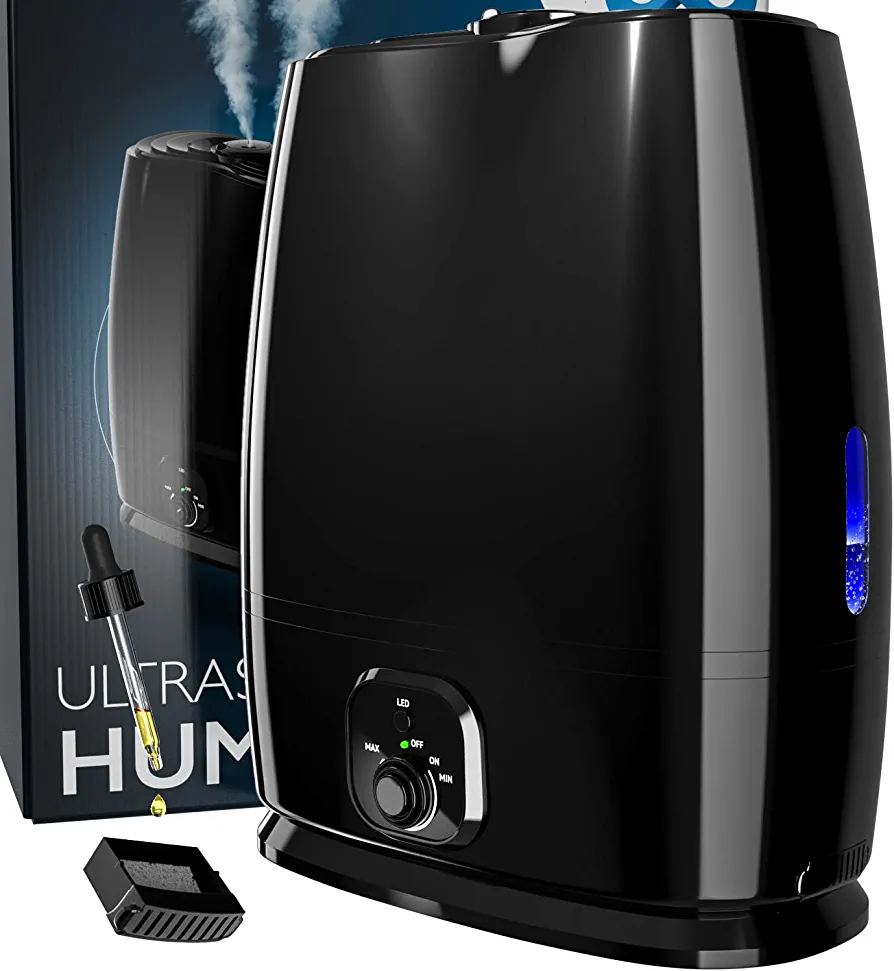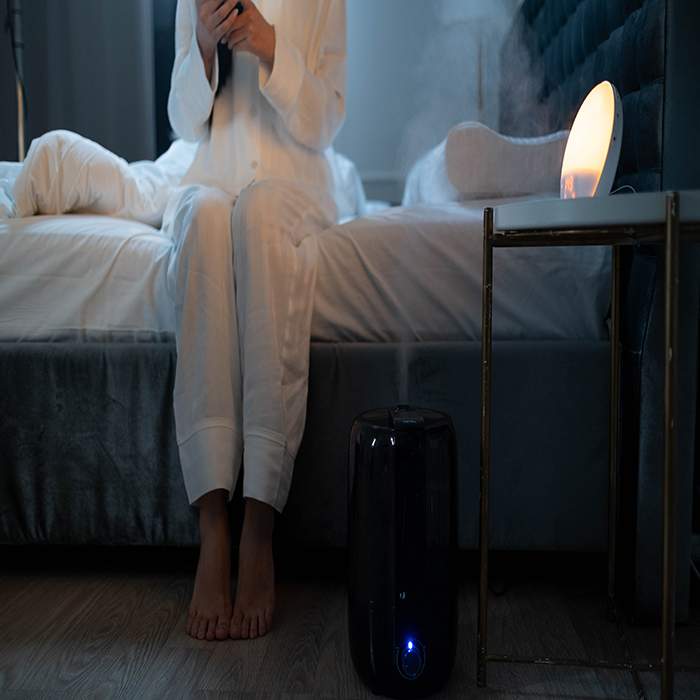Introduction

Does a humidifier help with asthma? Many people, including asthmatics and allergy sufferers, ask this question, as humidity plays a vital role in their daily lives.
As you know, low humidity has adverse effects on asthma symptoms. It causes mucus membranes to dry, leading to difficulty breathing and many more challenges.
Such as…
Rough skin, scratchy throat, dry and tethered lips, and in extreme cases, nosebleeds.
These discomforts tend to be more profound during the winter. The people in the Subsahara regions during the harmattan also experience the same thing.
And so…
There needs to be more than just switching on the heating unit to warm the air; you also need to maintain a certain amount of water vapour in your home.
Therefore, paying attention to your home’s moisture content is very important.
What is a humidifier?
A humidifier is an electrical device which you use to increase the humidity of a room or a whole building. If you seek to improve your room’s moisture content, installing a humidifier is the best and easiest way.
How do humidifiers work?
You use a humidifier to maintain optimal humidity levels in a room. They achieve this by ejecting water vapour, either in a cool or warm state, into the atmosphere, depending on the type of humidifier.

By so doing, you keep the moisture content of your room at an ideal level required for proper functioning of your respiratory system.
A humidifier dispels vapour into the air through different techniques. Depending on the type, these methods include fans, rotating disks or in advance air purifiers, disks that vibrate at ultrasonic speed.
Whatever method a humidifier uses, you want your indoor air adequately moisturised.
Is humidity good for asthma?
Humidity does play a crucial role in worsening or improving your asthma symptoms.
Dry nasal passages contribute to allergy and asthma flares. So, once dryness alters the membrane integrity of the mucus linen, it increases your susceptibility to attack by pathogens. This can also trigger your asthma.
Humidity helps alleviate asthma symptoms by moistening the epithelial linen of respiratory passages. It does this by moisturising your airways to maintain the respiratory tract’s normal working condition.
Hence, the reason you need a humidifier for asthma.
Does humidity make asthma worse or better?

Humidity can improve your asthma significantly. However, it can also make it worse depending on its levels in your home.
One of the keys to managing your asthma and allergy is to ensure that your indoor humidity meets the recommended standard levels.
While trying to control the moisture content in your room to avoid under-humidification, you must also strive to prevent over-humidification.
When you have abnormal humid level in your room, the excess droplets provide favourable conditions for spores, dust mites and fungi growth. These allergens can trigger or further exacerbates your asthma.
For persons with advanced allergies and asthma issues and immunosuppressed persons, over-humidification can pose a severe threat to your health.
What is the best humidity level for your home?
Now that you’ve known how humidifiers work, you need to know the acceptable humidity levels in your home.
According to the Environmental Protection Agency (EPA), the recommended indoor humidity levels are 30 to 50%.
And that should be your goal!
If the relative humidity level in your room exceeds the recommended range, it creates a conducive environment for mould, bacteria and other allergens to thrive in your home.
Also, when the moisture content is too high, you may experience difficulty breathing; this could result from the condensation of vapour in your respiratory tract, impeding the free flow of air.
In contrast, lower than 30% humidity may dry the mucus membrane lining your breathing channels. This dryness can further cause constriction of airways and worsen your asthma.
Under-humification can cause you to experience dry lips and skin to the point that moisturisers don’t affect your skin.
In addition to nosebleeds caused by this extreme lack of atmospheric vapour, you could also experience cracks in your wooden floors.
What type of humidifier is best for asthma?
If you must opt for a humidifier, you must consider a few factors, such as safety if you have kids or a pet, energy consumption, and most importantly the nature of your asthma.
Best humidifier for asthma, cool or warm?
The Cool and Warm Mist humidifiers are equally effective in humidifying the air.
The aim is to ensure you get enough humid conditions in your room to reduce your triggers and asthma symptoms. And both humidifiers can do that.
However, they each have their upsides and downsides, which play a massive role in your decision to get the humidifier that best suits you.
And the pros and cons of each humidifier is explained below…
Cool mist Humidifier
In a cool mist humidifier, the name could be a misnomer. Contrary to what the name suggests, the humidifier releases water vapour at room temperature.
This long-lasting air humidifier is safer around kids and is significantly effective in alleviating allergy and asthma symptoms, such as coughs and colds.
In addition, it is more efficient in energy consumption than the warm mist humidifier.
However, there’s an increased possibility for this humidifier to experience an accumulation of moulds and bacteria.
Another drawback noticed about this device; its fans are louder than the ones you see in warm mist models.
Warm Mist Humidifier
The warm mist humidifier uses a simple mechanism to perform its operation. First, its internal heating unit boils, and the steam cools as it discharges into the air.
This humidifier is more effective than the cool mist model in reducing the growth of bacteria and other pathogens.
Plus, it’s quieter and provides nice warm air during winter. Additionally, the warm mist is less expensive.
However, a significant drawback of the warm mist humidifier is its safety issues. A warm mist humidifier is dangerous to have around if you have pets or kids. It can easily cause steam burns if carelessly handled.
Also, it has a higher energy consumption and is not recommended for colds, as it may result in swelling of the nasal passages.
Does sleeping with a humidifier help asthma?
Sleeping with a humidifier can be helpful if you have a breathing challenge such as asthma, allergy or an infection of the sinus cavity.
Because a humidifier provides a soothing effect on the muscles involved in breathing, it relieves you of so much stress.
Your respiratory muscles relaxes due to the soothing relief from the moisture. Hence, you get the sound sleep that you crave.
But this is only good if you closely monitor your air humidifier to stay within the expected humidity level of 30 to 50%.
Humidifier or dehumidifier for asthma
While humidifiers restore moisture levels by ejecting vapour into the air, a dehumidifier, on the other hand, sucks in excess moisture from the air.
For persons with asthma and allergy sufferers, you need a humidifier and a dehumidifier to maintain an optimal humidity level in your home.
Your location doesn’t matter. We’ve seen humidity spikes at huge ranges. In some instances, you wake up, and it’d be 99% outside, and by noon it burns off. Sometimes, humidity indoors doesn’t correlate with the moisture levels outdoors.
To keep the moisture under control, you shouldn’t rely on just one solution. Taking care of both sides of the coin is vital.
Summary
Humidifiers are crucial for all asthmatics and allergy sufferers. Even though a humidifier isn’t a recommended cure for asthma, it’s essential to have it in your home to live a comfortable life with minimal asthma symptoms.
However, if you use a humidifier excessively and don’t monitor the quantity of mist it releases, this may lead to an over-humidified room which is terrible for your allergy and asthma.
Therefore, you need to monitor your humidifier frequently to achieve an optimal performance.
Frequently Asked Questions
Is a vaporizer good for asthma?
Steam vaporizers are good for asthma because they heat water into a mist, cool it, and release it into the air.
The vapour for some asthmatics can relax their respiratory muscles and ease their breathing.
However, if you have kids or pets, this humidifier is not child-friendly or pet-friendly.
The hot mist from steam vaporisers can cause steam burns; therefore, keep it from their reach
Are dehumidifiers good for asthma?
Dehumidifiers are good for asthma if appropriately used. The essence of dehumidification is to remove excess moisture in your room’s air to maintain an optimal humidity level.
But if overused, humidifiers can cause a drastic reduction of humidity. And this can cause severe breathing problems like asthma, and allergy attacks, thereby causing more harm than good.